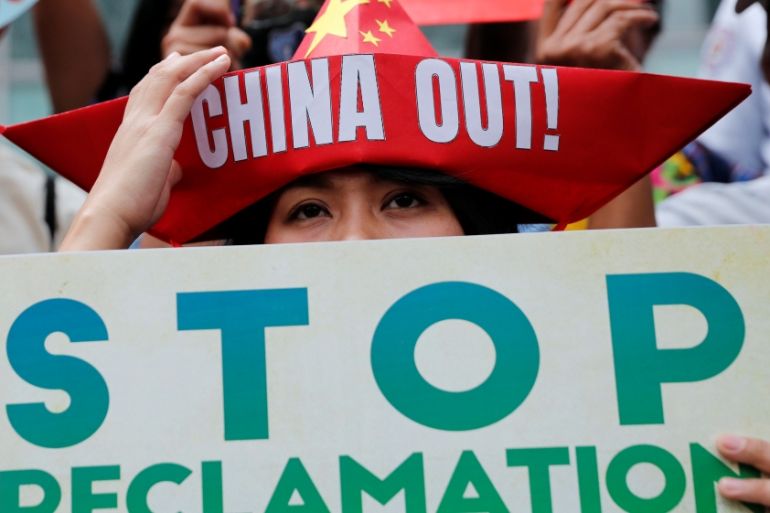Philippines protests ‘swarming’ of more than 100 Chinese vessels
President Rodrigo Duterte’s national security adviser reveals that 113 Chinese vessels were spotted near Pag-asa island.

The Philippines has “fired off” a diplomatic protest against China, following reports that more than 100 Chinese fishing vessels were spotted in recent days about a Philippine-administered island in the South China Sea.
Foreign Affairs Secretary Teodoro Locsin made the announcement on social media on Wednesday, shortly after the country’s national security adviser, Hermogenes Esperon Jr, revealed that 113 Chinese fishing vessels were spotted “swarming” Pag-asa island between July 24 and 25.
Keep reading
list of 4 itemsJapan, Philippines, US rebuke China over ‘dangerous’ South China Sea moves
Biden, Japan leader Kishida announce stronger defence ties in state visit
China’s Xi says outside interference can’t stop reunion with Taiwan
Esperon said he recommended the filing of the protest against China, but added that the government was unsure on the motivations of the Chinese vessels.
|
|
Locsin said he based his decision on “military intelligence.” Locsin is in Bangkok for a meeting of foreign ministers from Southeast Asia as well as the United States and China.
Pag-asa, also known as Thitu, is the second-largest naturally occurring landmass in the Spratly archipelago in the South China Sea.
The Philippines, China, Brunei, Malaysia, Taiwan and Vietnam have overlapping claims of the vast and resource-rich maritime area, which covers more than three million square kilometres.
The recent development comes in the wake of a report that Chinese warships have been passing through the southern Philippine island of Tawi-Tawi since February, without notifying Filipino authorities.
In June, Filipino fishermen accused a Chinese vessel of ramming and sinking their boat within the Philippines’ exclusive economic zone in an area the country called West Philippine Sea.
In April, it was also revealed that China has carried out mass harvesting of giant clams.
The Philippines has increasingly become more outspoken against China in recent weeks, despite President Rodrigo Duterte‘s pronouncements that he wants to maintain closer ties with Beijing.
‘Chinese bullying’
On Tuesday, Defence Secretary Delfin Lorenzana accused China of bullying, saying that Beijing’s peaceful assurances to Manila contrast with its behaviour in the contested waters.
|
|
“They say we do not bully people around, they follow international law, but I said you are not, what you are telling is not what you are doing on the ground,” Lorenzana said in one of his most stinging public rebukes yet of Chinese actions in territories claimed by Beijing, Manila and four other governments.
Unless China does what it says, its words will be doubted and Filipinos will continue to look at Beijing with mistrust, said Lorenzana, a retired army general.
He also cited China’s low trust ratings in local opinion polls compared with those of the US, a treaty ally of the Philippines.
In a speech in Manila late on Monday to mark the anniversary of the People’s Liberation Army, Chinese Ambassador Zhao Jianhua said his country’s peaceful intent is enshrined in the Chinese constitution and that it’s strengthening its military “entirely for the purpose of self-defence.”
“No matter how strong China may become, China will never seek hegemony or never establish spheres of influence,” Zhao said.
On the long-raging territorial disputes, Zhao said both sides should be patient and added that China would continue to adopt a policy of peaceful settlement rather than confrontation.
As the world’s second-biggest economy, China upholds freedom of navigation and overflight because nearly 75 percent of its imported and exported goods and nearly 80 percent of its imported oil and gas transit through the South China Sea, Zhao said.
Blocking the sea lanes would badly hit China’s economy, he added.

But Lorenzana said China’s takeover of the Scarborough Shoal following a protracted 2012 standoff is proof of Beijing’s “bullying” tactics.
The US brokered a deal for the simultaneous withdrawal of Chinese and Philippine ships from the vast fishing shoal, but Beijing reneged on its promise, prompting Manila to bring its disputes with China to international arbitration the following year.
The Philippines won the case, with the arbitration tribunal invalidating in 2016, China’s “historic claims” to virtually the entire South China Sea based on the 1982 UN Convention on the Law of the Sea.
China refused to participate in the arbitration and ignored the outcome.
Duterte, who revived ties with Beijing after taking office in 2016, has refused to immediately seek Chinese compliance to the arbitration ruling while seeking Chinese infrastructure funds and investment, often coming under criticism for his China-friendly approach.